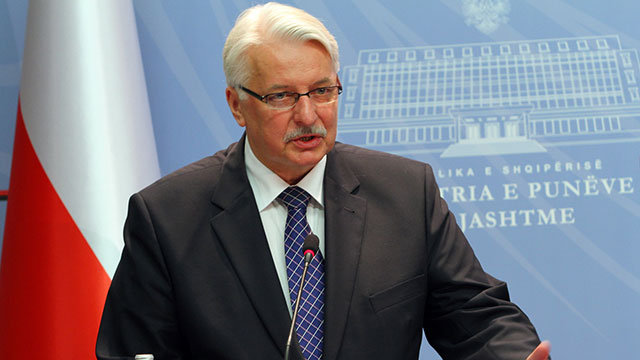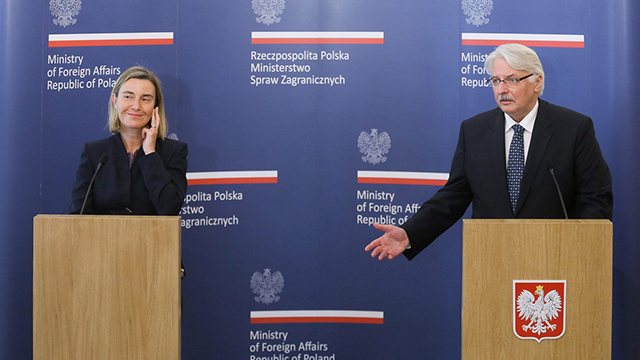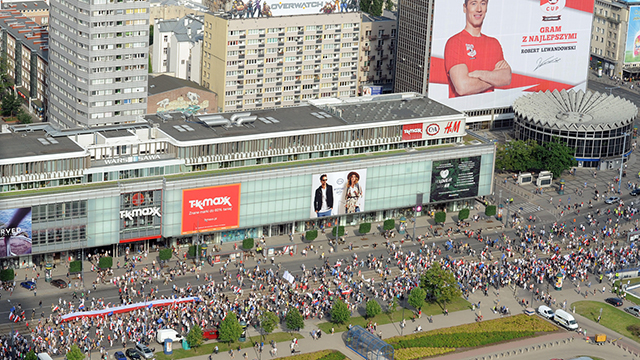Witold Waszczykowski recently gave an interview on the occasion of his visit to Israel, expressing his beliefs that Russia is provoking Europe, that a Britain-free EU would be bad, and that Iran can aid in creating regional peace.
Polish Foreign Minister Witold Waszczykowski arrived in Israel for an official visit on Tuesday. While the continent at large is in the midst of several crises, Waszczykowski’s young conservative government has drawn internal criticism by taking several steps seen as attempts to seize control of the country’s legal system and media.
Tens of thousands took to the streets of Poland’s largest cities to protest the government’s actions, and the European Union threatened to sanction Warsaw. But the continent at large is dealing with its own problems on a larger scale: mass immigration waves, the threat of ISIS, the crumbling Greek economy, and the upcoming British vote that will decide whether or not it will continue to be a member of the EU.
Above all, there’s the ongoing tensions with Russia, with increasing pressure in EU and NATO circles to prepare for an approaching conflict with Moscow. Poland is at the forefront of efforts to convince NATO to increase its preparedness in Russia-adjacent areas, just in case.
Waszczykowski, who met Prime Minister Benjamin Netanyahu on Wednesday, is a professional diplomat. His academic degrees are in history and philosophy, but he also has expertise in matters of security. Waszczykowski’s diplomatic career started after his country was freed from communist rule. Amongst his previous roles are Polish ambassador to Iran, head of the Polish negotiation team participating in placement planning for an array of American missiles in Poland, and head of the Polish communication bureau to NATO (before the country joined the treaty organization).

During their meeting, Netanyahu told Waszczykowski, “We have a growing friendship, and I look forward to the opportunity to discuss in concrete ways to make it even stronger,” later adding, “This is a worldwide problem, obviously, of rampant barbarism that attacks all of our societies. And I think the civilized nations must band together. I said this yesterday at the meeting with the NATO ambassadors, and I say it again to you. And I also say that we should not only cooperate on matters of fighting terror, but to cooperate in other matters—of technology, of trade. You have a robust economy. We have a robust economy. And I think the more we cooperate, the better it will be for both our peoples.”
Waszczykowski replied, “We have a chance today to discuss the situation in our regions—in your region, in my region. Both our countries face difficult problems, conflicts and sub-conflicts around, but at the beginning let me convey to you condolences because again there was a terrorist attack in Tel Aviv. So please accept my condolences and please let me convey the condolence to the victims of the attack.” He added: “There is a great opportunity, a great chance to develop a bilateral relationship, and you know, the Israeli technology can help us improve our situation, economic situation, and to develop our country further.”

Waszczykowski is known for his uninhibited speech. He has proposed recruiting young refugees into an ISIS-fighting force, said that Russia is more of a danger than ISIS, and was even quoted uttering a possible race-based pun when speaking about US President Obama.
As an historian, do you think that the EU has reached its limits and might not survive the current problems it is facing now?
“I do not think that in the foreseeable future we shall experience the demise of the EU. The benefits of integration by far outweigh the costs. The level of interconnectedness of our economies is so high that any problem in the functioning of the single market might entail very negative consequences for the Member states. As a matter of fact, I believe that we should invest our energies in completing the single market. But we should not try to be excessively ambitious by creating false impression that we are in the business of creating an European superstate. There is little demand for it and nation-states remain the backbone of our identities.”
What is the biggest threat to the EU as we speak?
“There are several threats, not a single one. The first one is the risk of wrong answer to the challenge of immigration. Second, it is the threat of Brexit, with negative consequences of losing a key EU member state. Third, it is the threat of still unanswered question about economic disparities among the EU members as well as sources of future economic growth and competitiveness. Last but definitely not least, there is a threat of insufficient awareness in some quarters of the EU of the seriousness of the geopolitical challenge posed to our cohesion by a resurgent and nationalist Russia.”
Was Germany’s chancellor, Angela Merkel, wrong in her decision to allow so many refugees and immigrants in?
“Undoubtedly migration crisis dominated the European agenda in the recent months. At the beginning of 2015 neither Poland, nor Germany and the EU as the whole, expected the crisis would expand to such dimensions. It would be futile to concentrate on our original assumptions. Now, we should focus on finding the universal solution to overcome the crisis as it concerns, with different intensity, all of the EU Member States.”
“The dynamics of this crisis is unpredictable and it depends on figures and directions of the migration routes. Currently we are facing redirection from Balkan route towards Adriatic Sea and Italy. As a European community we are obliged to react to the crisis in the spirit of solidarity and from this point of view we understand the initial intensions standing behind Germany’s approach to migration. Poland sees the necessity to help people in need of international protection. At the same time we stand on the position that the migration crisis can be solved by effectively dealing with the genuine – i.e. external – causes of migration. While it is not possible to cope with them for the time being, in my opinion the EU should focus on solutions such as tightening external border controls, maintenance of the integrity of the Schengen zone and closer cooperation with third countries.”
“Poland, like other countries from our region, perceives the need for a broad European involvement in the external dimension of migration. We are ready for an extraordinary commitment aiming at the protection of the EU external borders, also through provision of relevant technical assistance. We are reinforcing our commitment to development of assistance and humanitarian aid, as well as to cooperation with the third countries in the area of counter-terrorism. At the same time, due to the very limited experience of social and political interaction with the Middle East, we cannot afford to fully participate in the redistribution mechanisms or other forms of central management of the migration flow inside the EU.”
Can you imagine an EU without Great Britain?
“Without Great Britain the European Union would be a different and worse Union than the one we have at the moment. The UK was not among the Founding Fathers of the European integration but its contribution has been vital. By losing UK as a Member, the EU would be in a worse position to exert influence on the international scene. We would lose an important force for making our economies more competitive. Poland would lose an important ally in an attempt to reform the EU. And Brexit might pave the way for centrifugal forces elsewhere in Europe. Furthermore, although legal and political dynamics of negotiation between the EU and the UK after the “leave” vote are difficult to predict one thing is clear- the process would be cumbersome and time consuming.”
The EU criticizes the Polish government for decisions it took, mainly regarding the constitutional court, that are considered as “autocratic”. Mass demonstrations are being held in Poland’s big cities against the policies of the conservative government. Is a conflict with the EU avoidable?
“Speaking about a conflict is misleading and it does not reflect the dynamics of our contacts with the European Commission. Our Government continues a constructive dialogue with the Commission in a cooperative spirit. Our aim is to explain where there is a political problem to be solved internally by the Polish government and opposition and where we have to deal with a serious divergence of legal opinions. A dialogue with the Commission is natural for us: we are a EU Member State and the European Commission is our institution. Institutions can ask questions, but our dialogue has to be based on crucial principles such as objectivity and respect for sovereignty. We are pleased that the EC’s First Vice President Frans Timmermans admitted that the crisis should be resolved in Poland and that the Commission didn’t want to intervene in Polish internal affairs.”
Are you fearing a new Russian attack in the Ukraine this summer?
“Russia continues to develop its military capabilities on Alliance’s Eastern flank. It is very important to notice that Russian militarization programme started long before the aggression on Ukraine: this process has been going on at least since 2008. We are witnessing a growing militarisation of the Kaliningrad oblast and an increase of forces deployed in Pskov and Saint Petersburg oblasts. Russia develops capabilities which can restrict NATO’s manoeuvre field in Eastern Europe. It enhances its conventional forces, also of offensive nature. Plans of creating new military units in the Russian Western Military District have already been announced. We can also observe numerous Russian provocative actions (dangerous military incidents), confrontational political statements towards particular states of the Baltic region and other activities undermining regional security, like ‘creative’ interpretation of the confidence building measures and arms control regimes. That is why Russian threat to European security architecture, including Baltic Sea region, has to be taken seriously.”
What can the EU and NATO do in order to contain Russian activism outsides the national borders of the federation?
“The European Council agreed in March 2015 that the duration of the restrictive measures against the Russian Federation should be clearly linked to the complete implementation of the Minsk agreements. This position was repeated by Ministers of Foreign Affairs of all EU Member States in March this year when they reaffirmed the EU’s unity based on existing policies and principles. Ministers supported five principles guiding the EU’s policy towards Russia, in particular implementation of the Minsk agreement as the key condition for any substantial change in the EU’s stance towards Russia. We agree with the following logic of the implementation of the Minsk agreements: first we need to address security issues, reaching a long-lasting ceasefire, full exchange of prisoners, the OSCE Special Monitoring Mission’s full access to the entire conflict territory, including to the Ukraine-Russia border. It is clear that security provisions must be met in the first place and Russia as a key role to play with this regard. It is difficult to implement political commitments while clashes occur at the line of contact on daily basis and other provisions on military issues are not fulfilled.”
You have served in Tehran. Do you see a positive evolution in Iran and how do you analyze the agreement signed on the nuclear issue with the Iranians?
“Polish-Iranian cooperation is especially close to me. In the course of my career I had the pleasure to serve as the Polish ambassador in Iran. I remember this period with great fondness. We recognize the desirability of active involvement of Iran in the peaceful settlement of regional conflicts, on the basis of the principle of non-interference in internal affairs, dialogue and seek peaceful solutions. I would like to emphasize that we welcome positive changes in Iran’s foreign policy, initiated by President Hassan Rouhani. They were intensified after the conclusion of the Agreement on Iran’s nuclear program (Joint Comprehensive Plan of Action) on the Iranian nuclear program.”
Having dealt with security issues, how big a threat do you think ISIS is and would should be done against it?
“The existence of Daesh is a very difficult problem for our civilization, and we have to commonly find a solution how to fight it. We have to find a solution how to stabilize Middle East, how to stabilize North Africa, and these are the problems we are just discussing together.”
The issue of Jewish property in Poland has shed a heavy shadow on the good relations between Poland and Israel. Is the current government ready to work for a Juarez solution of this matter?
“The difficulty and complexity of the matter lies in the fact that Poland was severely ravaged during World War Two. Its borders changed dramatically, which, in turn, resulted in a mass resettlement of populations living on Poland’s territory. That also affected the question of property and ownership. Nevertheless, property restitution has been underway in Poland for well over two decades now.
Restitution should not be regarded as an element of international politics. Nor should it be seen as a problem in Polish-Jewish relations. This is because only approx. 15% of those potentially interested in restitution are Jews now living outside of Poland. The remaining 85% are current non-Jewish Polish citizens. Property restitution is a process in which claimants’ ethnic or religious background is irrelevant: the Polish law treats everyone in the same manner. As far as private property is concerned, the existing legal system in Poland makes it perfectly clear that any legal or natural person (or their heir) is entitled to recover prewar property unlawfully seized by either the Nazi German or the Soviet occupation authorities, or by the postwar communist regime. Claimants may use administrative and/or court procedure to demonstrate that their property was unlawfully seized and to recover it. ”

What are the main objectives of your visit to Israel?
“The objective of the visit is to confirm the very good state of our bi-lateral relations as well as to emphasize Poland’s efforts directed at creating peaceful solutions to the conflicts in the EU’s southern neighbourhood. A tangible expression of this was our delegation’s participation in the Paris Conference, dedicated to discussing opportunities to restart the Middle East Peace Process. The visit also follows an intensification in recent months of our bi-lateral contacts on the highest level with Israel and other partners in the Middle East, including Egypt, Jordan, Lebanon as well as the Palestinians. It also serves as a preparatory element for the G2G intergovernmental meeting in November as well as the Polish president’s upcoming visit to Israel, Palestine and Jordan. Our talks covered several regional and security issues, including the Syria conflict, the flow of refugees, fighting the Islamic State and other forms of terrorism as well as Poland’s engagement in the Middle East. We also exchanged views on relations with Russia and its involvement in the Middle East. Within this context, I presented our views regarding Moscow’s policies towards Ukraine and countries within the EU’s eastern neighbourhood. We also discussed ways to break the impasse within the Middle East Peace Process.”
How and in what domains would it be possible to strengthen relations between both countries?
“We are looking to deepen bi-lateral relations and increase contact between the citizens of our two countries, in particular with regards to the younger generation.
We want young Jews to not only associate Poland with the Holocaust, for them to discover Poland for what it is – a modern and dynamically developing country in the European Union. We want to continue our economic co-operation, above all in the field of modern and green technologies. We are interested in Israel’s experiences in promoting these sectors of the economy. Our very good political relations have the potential to translate into economic gains, including for the defence industry. With this in mind, we are interested in the exchange of experiences regarding know-how and the promotion of direct investments.”
As a person who grew under the communist regime, have you ever thought that such good relations between your country and Israel would ever be possible?
I have always believed that Poland would regain full independence and would be able to once again lead a fully sovereign foreign policy, within which it strengthens ties with key partners around the world. Polish-Israel relations have a special, privileged character. Poland was one of the first countries to back the idea of dividing Palestine and recognizing the state of Israel. Jews from Poland made a significant contribution to building the economic and military-defence potential of Israel. At the same time, we remember that over centuries Jews helped shape Poland’s economy, culture and science. The shared history of our nations is very long and complicated. We are not afraid of talking about it openly. But we are also focused on the future and are looking for new opportunities for our Polish-Israeli partnership.”
As reported by Ynetnews
